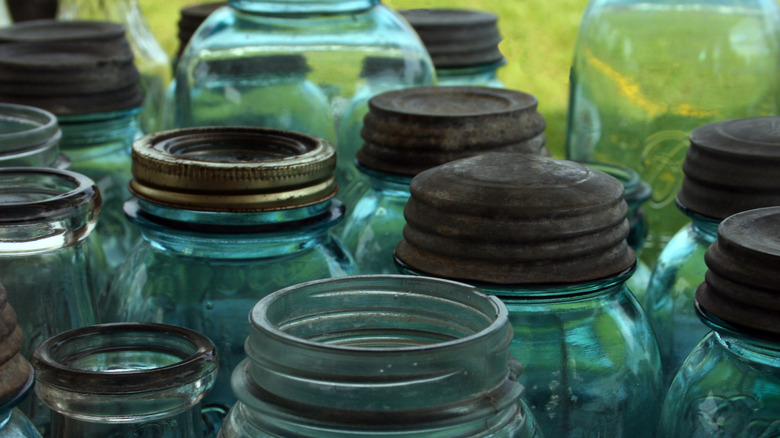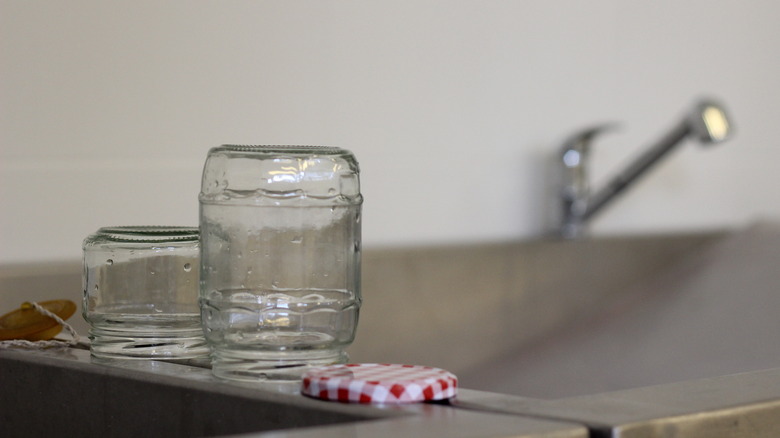Don't Toss Rusted Mason Jar Lids, Use These Simple Ingredients To Clean Them
We may receive a commission on purchases made from links.
The internet abounds with rust removal remedies, from rubbing damp, balled-up aluminum foil on brown-scaled stainless steel chair legs to the top-rated cleaning products to use to banish rust. Mason jar lids may come into contact with food, even if it's just your regular morning cereal, and therefore need to be sterile and chemical-free. Thankfully, cleaning the rust off mason jar lids requires just two food-safe ingredients you probably have already: baking soda and lemon juice. Apply a spoonful of baking soda to the rusty lid, squeeze over some lemon juice, and scrub away with a sponge until the rust is gone. Be prepared to scrub a lot; this isn't a quick fix.
Why you can easily remove rust from stainless steel surfaces with these two ingredients — or indeed, from any metal surface — is down to abrasiveness and a little basic chemistry. Rust is alkaline, so exposing it to an acid, like lemon juice, causes a chemical reaction that lifts the rust from the surface. Like rust, baking soda is also alkaline. Mix baking soda and lemon juice (or any liquid acid), and the resulting release of carbon dioxide gas causes foaming. Carbon dioxide is one of the agents that corrode metal, causing rust. However, it's also used on a commercial scale to remove metal corrosion, for example, with dry ice blasting. The actual action at play here is baking soda's scratchiness. The powder grinds away the rust on the metal lid that's been loosened by the lemon juice.
How to use lemon juice and baking soda to restore the shine to mason jar lids
It's more practical and affordable to purchase a bottle of lemon juice over squeezing the fruit. Walmart sells 15 fluid-ounce bottles of 100% real lemon juice for well under $4. Any old baking soda will do; if you have some in your pantry already, use that. Otherwise, you can buy it at most big box retailers or supermarkets. For example, Walgreens has a 1-pound box of Arm & Hammer baking soda for less than $2. You'll also need a cloth, sponge, or scrubbing brush. A dish sponge with a soft and abrasive side works best — get a pack of nine Scotch-Brite heavy-duty scrub sponges for about $8 on Amazon.
Bring your rusty mason jar lids to the kitchen sink. Working with one at a time, dollop a tablespoon or so of baking soda into the lid and pour on about another tablespoon of lemon juice. The measurements don't have to be super accurate; after a few lids, you'll work out the right ratios for the level of rust you're dealing with. Now, warm up your arm muscles, pick up your implement of choice, be it sponge, cloth, or brush, and start scrubbing. Focus your efforts on one patch of rust at a time until it's gone, then move on to the next. Rinse, and place them on a dish rack, the top rack of your dishwasher, or a clean dish towel to dry.
Lemon juice and baking soda best practices for mason jar lid rust removal
Alternatives to baking soda include table salt, borax (note that it's caustic and can burn your skin, so wear long sleeves, gloves, and goggles), and white toothpaste. All of these options are natural and, most importantly, abrasive. Don't want to buy lemon juice or have a lemon tree growing in the garden? Replace it with distilled white vinegar. They both have around the same pH value.
For stubborn rust patches, submerge the lids in the lemon juice (or vinegar) and leave them in the acidic liquid overnight. For extra credit and cleanliness, run the lemon juice and baking soda (or alternatives)-soaked sponge around the mouth of your jars to remove any rust stains. Rinse the jars with fresh water and set them aside to dry thoroughly before reuniting them with their lids. Now, all that's left is to stand back and admire your genius. This is, after all, one of the more clever ways to use baking soda for a cleaner kitchen.
Whatever natural acid and abrasive substance you decide to use, note that this method will likely only work if the lids are dotted with rust and not coated in the stuff. Plus, you should never do this with jars used for canning or wet food storage. Always use new lids for those purposes to prevent contamination. Oh, and be sure to store the lids in a cool, dry, and dark place to prevent further rust.

